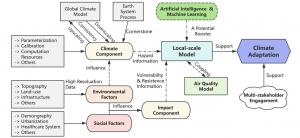From global forecasts to local resilience: Why small-scale climate models matter now
GA, UNITED STATES, October 14, 2025 /EINPresswire.com/ -- As the world faces escalating climate threats, global models alone cannot meet the urgent demand for localized adaptation strategies. This study underscores the critical role of high-resolution, local-scale modeling tools that integrate environmental, social, and economic dynamics to support climate adaptation and sustainable development. By bridging the gap between global projections and local realities, these models can help communities better assess risks, plan targeted interventions, and strengthen resilience against extreme weather and long-term climatic changes. The authors call for accelerated international collaboration to develop advanced, accessible modeling frameworks that can guide evidence-based decision-making for adaptation at the regional and city levels.
Climate change is intensifying extreme weather events—from heatwaves and floods to wildfires and droughts—posing unprecedented risks to ecosystems, infrastructure, and public health. While global climate models have advanced our understanding of large-scale processes, they often lack the resolution to address local impacts where policy and planning decisions are made. Regional variations in topography, urbanization, and socioeconomic conditions demand more granular data and simulation capabilities. Without such detail, adaptation measures risk being overly generalized or ineffective. Due to these challenges, developing tailored local-scale climate models that can link scientific prediction with on-the-ground adaptation has become an urgent global priority.
A new perspective published in Frontiers of Environmental Science & Engineering (online September 25, 2025) by researchers from Fudan University, the University of Copenhagen, and the University of Helsinki highlights the pressing need for local-scale climate modeling tools to support adaptation and sustainable development. The paper outlines how integrating high-resolution environmental data, social factors, and real-time urban information can transform global forecasts into actionable insights, empowering communities to design more resilient cities and policies in the face of accelerating climate change.
The authors emphasize that local-scale models—operating at city, regional, or national levels—are indispensable for tailoring adaptation strategies. These models can simulate fine-grained variations in climate conditions, incorporating topography, land use, demographics, and infrastructure data to identify vulnerable areas and evaluate adaptation scenarios. The study reviews current challenges in model development, including limited data availability, lack of multi-scale integration, and the complexity of coupling climate dynamics with socioeconomic systems.
To overcome these barriers, the paper recommends advancing data integration through satellite remote sensing, machine learning, and collaborative data platforms such as the World Urban Database (WUDAPT). It also highlights emerging “One Atmosphere” and “Seamless Earth System” modeling approaches that link global and local processes for improved consistency and feedback. Artificial intelligence and physics-informed machine learning are expected to revolutionize model calibration, making tools more efficient and accessible to developing countries. By combining environmental science with digital technologies, local-scale modeling can become a cornerstone of evidence-based adaptation planning, early warning systems, and long-term climate-resilient urban design.
“Local-scale modeling marks the next frontier of climate adaptation,” said Prof. Alexander Baklanov, co-author from the University of Copenhagen. “Global models give us the big picture, but communities live the consequences locally—where geography, infrastructure, and human behavior intersect. We urgently need multi-scale, interoperable models that can translate global climate projections into actionable, context-specific insights. Only then can science effectively support policy decisions that protect lives, economies, and ecosystems.”
Local-scale modeling frameworks hold immense promise for guiding urban planning, infrastructure design, and risk management under a changing climate. By integrating meteorological, environmental, and socioeconomic data, these models can support early warning systems, disaster preparedness, and climate-smart development policies. Importantly, their accessibility through open-source platforms and AI-enhanced tools enables adoption even in resource-limited regions. The authors urge governments, researchers, and international organizations to prioritize the co-development of such models as part of national adaptation plans. Strengthening local modeling capacity today will be key to achieving sustainable, resilient societies in the decades ahead.
References
DOI
10.1007/s11783-025-2091-7
Original Source URL
https://doi.org/10.1007/s11783-025-2091-7
Funding information
The authors acknowledge the support of the National Natural Science Foundation of China (Nos. 42288101 & 42375183), Shanghai International Science and Technology Partnership Project (No. 21230780200), Shanghai B&R Joint Laboratory Project (No. 22230750300) and EU HORIZON Project FOCI (No. 101056783).
Lucy Wang
BioDesign Research
email us here
Legal Disclaimer:
EIN Presswire provides this news content "as is" without warranty of any kind. We do not accept any responsibility or liability for the accuracy, content, images, videos, licenses, completeness, legality, or reliability of the information contained in this article. If you have any complaints or copyright issues related to this article, kindly contact the author above.
